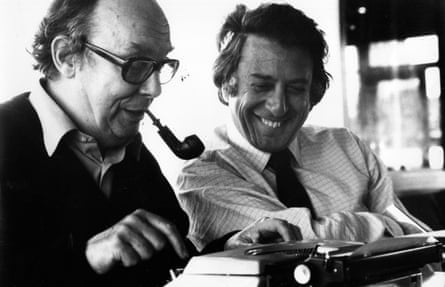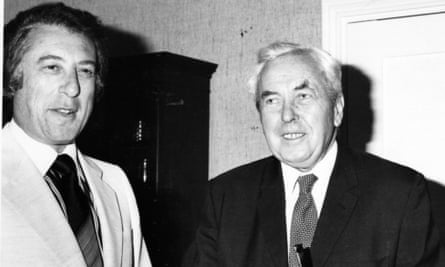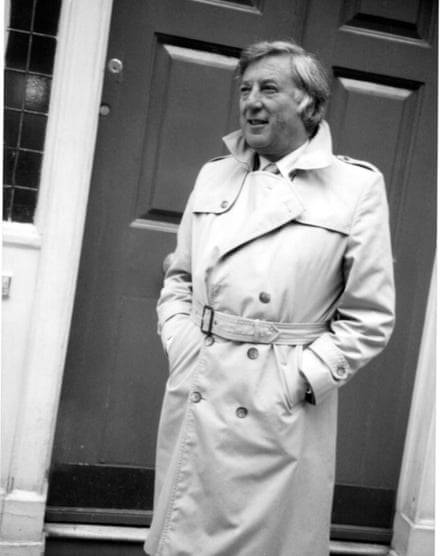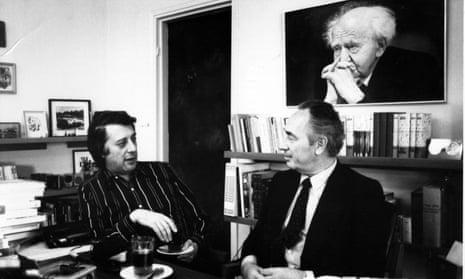Michael Freedland, the writer and broadcaster, who has died aged 83, called his 2005 autobiography Confessions of a Serial Biographer. He was indeed that, writing well over 40 (“I lost count,” he once remarked), mainly of Hollywood and show business figures, from Frank Sinatra, Judy Garland and Katharine Hepburn to Elvis Presley, Gregory Peck and Al Jolson.
But he was far more. As a broadcaster he presented and produced a pioneering magazine-style radio programme, You Don’t Have to Be Jewish, which ran for more than 24 years, first on BBC Radio London and then on LBC. With guests from presidents and prime ministers to taxi drivers and charity volunteers, the show was a weekly must-listen for the Jewish community; appearing on it was a sign that a guest had “arrived”.
Michael was also one of the most prolific print journalists of the past 50 years, with an auspicious start to his career. In 1957, as a junior reporter on the Luton News, he was the only reporter present at Harold Macmillan’s speech in Bedford in which he first said that Britons had “never had it so good”. Michael spotted the impact of the phrase and filed his copy immediately.
At various times a regular in the Guardian, the Observer, the Times and the Sunday Telegraph, Michael could turn his hand to almost anything – and would write about everything from food to religious education if he could persuade an editor to commission him – but he was peerless when it came to reflecting on the great showbiz figures, most of whom he had interviewed.
His biography of Al Jolson (1972) remains the seminal work. And his Witch Hunt in Hollywood: McCarthyism’s War on Tinseltown (2009) is one of the most readable and damning accounts of that period. As he put it: “For communist read Jew. The hearings … were as much (some would say more) antisemitic as anti-communist. Hollywood was chosen for the attack because of the great publicity value the movie capital offered. It was also a great opportunity to get at the Jews of Hollywood.”

He was the only journalist to interview Harper Lee, the author of To Kill a Mockingbird, while researching his biography of Peck in 1978. The film star telephoned the reclusive author at her New York apartment to set up the meeting: “Now Harper. I want you to meet this nice young man. From England. You won’t let him down, will you?”
Although Michael adapted to changing journalistic habits, he was of the old school. As the editor of the Jewish Chronicle, the paper for which he had written for a (surely record-breaking) 67 years, I would get a regular suggestion of lunch, at which he would fire off idea after idea. It would dawn on me afterwards that I had made a dozen commissions.
Born in London to Dave Freedland, manager of a menswear shop, and Lily (nee Mindel), Michael was raised in Luton. Even as a child he adored newspapers and news. After leaving Luton grammar school in 1951, aged 16, he secured a job on the Luton News as a copy-holder (who would read aloud the copy to the proof-reader), the lowest rung on the journalistic ladder.
He was quick to learn how to freelance. He sold his first story that November, when he submitted a paragraph to the Jewish Chronicle on the Luton presence at the remembrance parade in Whitehall of Jewish ex-servicemen. He was paid 10 shillings and sixpence, which he thought made him “rich beyond measure”.

Within nine years he had progressed to working on Fleet Street – but not before he felt he had to turn one job down. Offered a position at the Daily Herald, he was told that there were already enough Jewish-sounding names and he would need to write under a pseudonym. At a time when many Jews were reluctant to be identified, Michael never felt other than proud of his roots.
This led to the creation in 1971 of the landmark You Don’t Have to Be Jewish, which he wrote, presented, edited and produced. For many, Sunday at 9.30am on BBC Radio London became a fixed slot. The programme reported on “the world through Jewish eyes, but not necessarily for Jewish ears”, as the Radio Times put it. It would feature everyone from Golda Meir and Harold Wilson to Mel Brooks and Ron Moody – as well as hard news, such as live coverage following the Israeli raid on Entebbe in 1976, and secret recordings made in Moscow and Leningrad of interviews with Soviet refuseniks.
Michael had an eye for talent. His Washington correspondent was a novice, Wolf Blitzer, now a heavyweight on CNN. And from Israel he would take reports from Chaim Herzog, who became the country’s president.

After moving to LBC the programme ran, unbroken, until 1994 – and for many Jews, Michael’s voice was quite simply the voice of British Jewry. For a community that had tended to keep as quiet as possible, the weekly presence of the show on mainstream radio was transformative.
His broadcasting continued until his death, with a recent series on BBC Radio 2 on showbiz legends and, earlier this year, a three-hour BBC Radio 4 Extra programme, The Freedland Files, in which he trawled through his archive tapes.
For all his professional success, his first love was his family. He married Sara (nee Hocherman) in 1960. She was also a journalist, the creator and editor of the Jewish Chronicle’s children’s page.
Optimism had always been his defining characteristic; that was sorely tested towards the end of his life with Sara’s death in 2012 followed by that of his first-born daughter, Fiona, two years later.
But he carried on working – always pitching, always looking for angles. His latest biographical commission, a book on Charles “Chuck” Levy, a Hollywood lawyer – took him to South Dakota, where he suffered a fatal heart attack.
He is survived by his daughter Dani, son, Jonathan, and grandchildren, Beth, Ellie, Ben, Jamie, Jacob and Sam.
